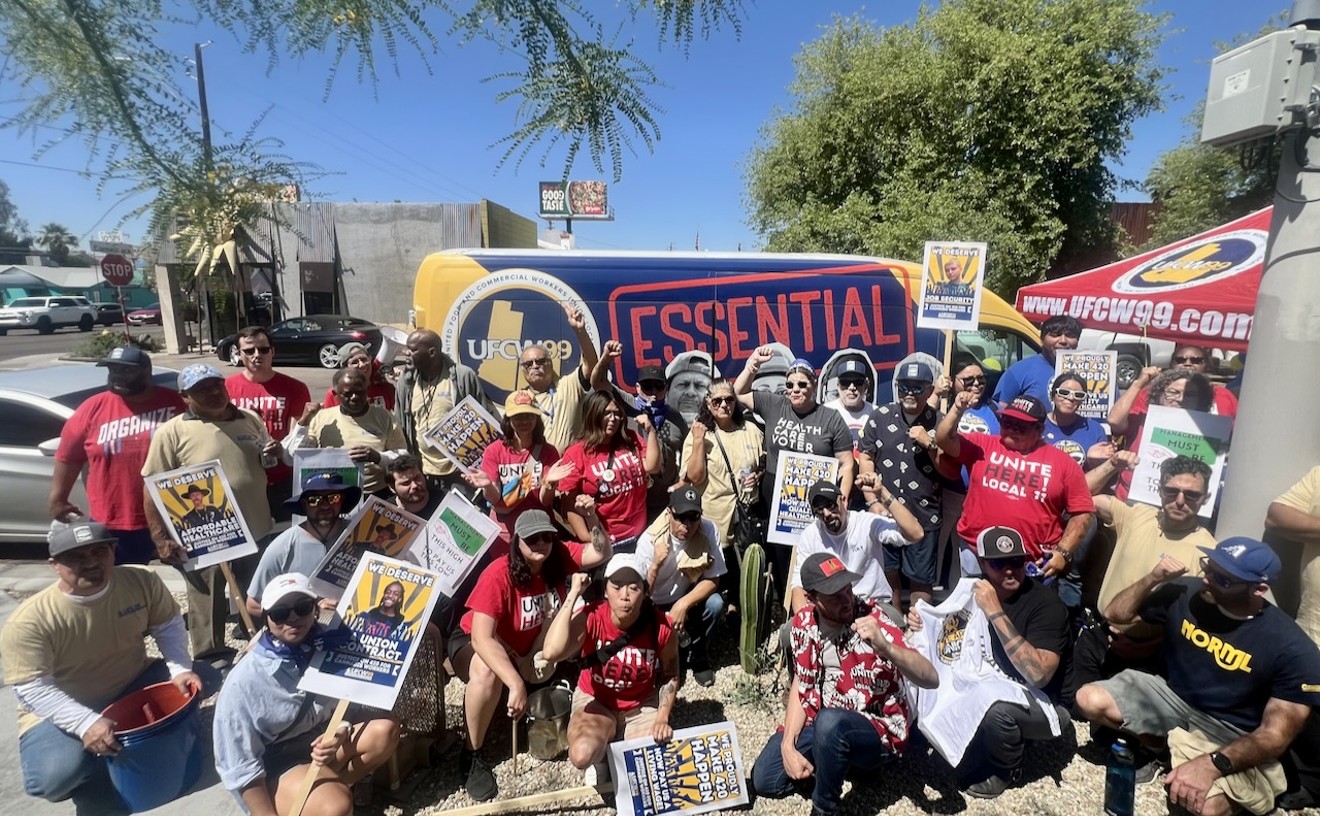Yet Arpaio continues to skate toward potential re-election despite his role in many of the same actions that got his former ally, ex-Maricopa County Attorney Andrew Thomas, disbarred today.
Justice could still take place for Arpaio in the form of a criminal indictment from the U.S. Department of Justice, which for more than three years has been looking at alleged civil rights violations by Arpaio that include the claims of abuse-of-power addressed today in regard to Thomas.
There was an "unholy collaboration" between Arpaio and Thomas in their unethical fight against political enemies in the county, the state Supreme Court's disciplinary panel wrote in the opinion released today.
As far as Thomas and his former underlings are concerned, the evidence against them "speaks for itself" in terms of an apparent collaboration, the panel says. Thomas, Lisa Aubuchon, and Rachel Alexander never looked for evidence that might have stemmed from the investigations conducted by Arpaio's office, "because they always knew there was none," the panel concluded.
Aubuchon testified that she would casually sit in the office of Arpaio's former chief deputy, Dave Hendershott, "some evenings" to talk about the tactics in the county fight -- and Arpaio was there -- the panel wrote.
Presiding Disciplinary Judge William O'Neil, attorney Mark Sifferman, and the Reverend John Hall note somberly in their findings, "The Sheriff is not subject to the Professional Rules of Conduct for attorneys."
Arpaio is, however, subject to the whims of voters. It remains to be seen how seriously county residents will consider the evidence of Arpaio's corruption that surfaced in the case against Thomas, Aubuchon, and Alexander.
In 2009, for example, Arpaio and his chief deputy ended up "closing their eyes" to the Constitutional rights of Supervisor Don Stapley, the panelists wrote. Despite having no convincing evidence of a crime committed by Stapley and having been warned by Yavapai County Attorney Sheila Polk that the case wasn't ready, Arpaio ordered the arrest anyway.
When confronted later about the blatantly unethical act by Polk, Arpaio "exploded," the panelists noted.
They wrote that the "fake court-tower investigation," launched under Arpaio's direction, was "subterfuge from the beginning."
As with much of the apparent corruption committed by Arpaio's office, the sheriff cries that he was "duped" by Chief Deputy Hendershott. The evidence, however, shows that Arpaio wasn't really duped.
Under Arpaio's leadership, sheriff's deputies were used like a personal goon squad to intimidate county employees. The panelists wrote:
The testimony regarding the purported Court Tower investigation, which involved entering the sanctity of the homes of large numbers of county employees, often on weekends, was surreal. The evidence was that officers, often late at night, with surreptitiously hidden recorders, demanded to enter the homes of these individual employees to interrogate them.
On Page 21, the panelists wrote that while the actions from Arpaio's office became "increasingly questionable," Thomas failed in his duty to provide some check and balance.
In December 2009, Arpaio stood next to Thomas at a news conference and announced that they were filing a federal racketeering lawsuit against county officials, judges, and lawyers. As we noted then, the lawsuit was full of flaws and presented poor evidence.
The disciplinary panel summed up the devious scheme in today's opinion:
With the RICO action Mr. Thomas, Ms. Aubuchon and Ms. Alexander abused their power and authority as County officers. They filed and prosecuted the action in retaliation against the defendants, not based upon any alleged criminal activity, but rather based upon the defendants' exercise of lawful authority that frustrated and infuriated Mr. Thomas and Sheriff Arpaio.
If Thomas, Aubuchon, and Alexander abused their power with this action, so did Arpaio.
Of course, the damning portrait of a corrupt sheriff binding himself to a corrupt prosecutor can't be completed just by looking at his scandals with Thomas. Arpaio has numerous scandals of own for the public to consider before the election, including potential campaign crimes and what the Justice Department calls the worst case of racial profiling U.S. history.
Without Arpaio's unhealthy influence, Thomas might still be a lawyer today.











